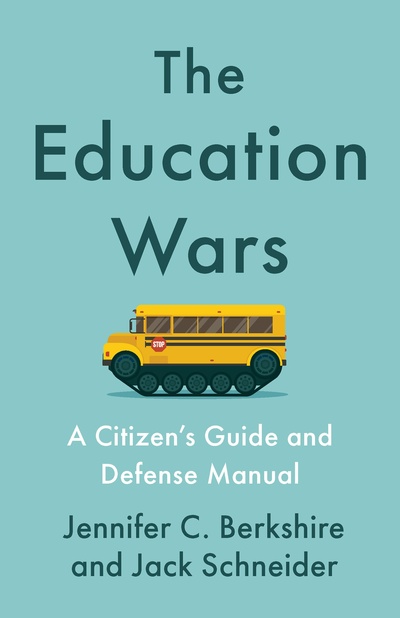Book Release and Author Visit: Jennifer C. Berkshire and The Education Wars
By Eileen E.School may be out, but the future of public education is still in session. Pennsylvania courts recently deemed the state’s underfunding of public schools unconstitutional. The State House is poised to consider an education funding bill that would mandate a $1.4 billion investment over seven years in the Philadelphia County School District alone. This boon in funding comes as a much-needed lifeline to a school system blighted by underpaid educators, asbestos, and only two full-time librarians employed by the entire district. And Philadelphia public schools’ struggles are not entirely unique, unfortunately.
A new book takes to task a key question arising from this issue ... Why should we continue to invest in public education?
Join us as we welcome Jennifer C. Berkshire, a freelance journalist, and host of the education podcast Have You Heard. Berkshire will discuss the release of her new book, The Education Wars, which she co-authored with Jack Schneider. The book explores public education’s inception as an equitable tool that prepares young folks to participate in our nation’s democracy. The divisive state of our republic has pushed education to the fore of several critical arguments on hot topics like religion, civil rights, and poverty. As they take on each issue and examine the architecture of an imperfect system, Berkshire and Schneider glean the silver lining from the oft-vilified school board and a long line of politicians broadly proclaiming that the entire public school system has failed. They patiently attest that public education is worth every care dressed as a disappointment and that it is the glue that strengthens communities like no other institution can. The Education Wars examines how schools have become a battleground on which the culture wars are being staged as part of a greater attack on public education. As a long-overdue handbook and guide to action, this book will enrage and enlighten the millions of citizens who believe in their public schools.

Please join us on Tuesday, July 2 at 5:30 p.m. in the Skyline Room on the Fourth Floor of Parkway Central Library for an insightful talk with Berkshire and a conversation with guest speakers. Copies of The Education Wars will be available for purchase at this event through The Head and the Hand. Please visit bit.ly/flp-education-wars for registration and event information.
Beyond The Education Wars, here are some books that explore issues around defending public education:
Cutting School: Privitization, Segregation, and the End of Public Education (2017) by Noliwe Rooks
Public schools are among America's greatest achievements in modern history, yet from the earliest days of tax-supported education — today a sector with an estimated budget of over half a billion dollars — there have been intractable tensions tied to race and poverty. Now, in an era characterized by levels of school segregation the country has not seen since the mid-20th century, cultural critic and American studies professor Noliwe Rooks provides a trenchant analysis of our separate and unequal schools and argues that profiting from our nation's failure to provide a high-quality education to all children has become a very big business.
Education and Capitalism: Struggles for Learning and Liberation (2012) edited by Jeff Bale and Sarah Knopp
In the first decade of the 21st century, a conservative, bipartisan consensus dominates about what's wrong with our schools and how to fix them. In each case, those solutions scapegoat teachers, vilify our unions, and promise more private control and market mentality as the answer. In each case, students lose — especially students of color and the children of poverty. This book, written by teacher activists, speaks back to that elite consensus. It draws on the ideas and experiences of social justice educators concerned with fighting against racism and for equality, and those of activists oriented on recapturing the radical roots of the labor movement. Informed by a revolutionary vision of pedagogy, schools, and education, it paints a radical critique of education in corporate America, past and present, contributing to a vision of alternatives for education and liberation. Inside are essays that trace Marxist theories of education under capitalism; outline the historical educational experiences of emergent bilingual and African American students; recap the history of teachers' unions; analyze the neoliberal attack on public schools under Obama; critically appraise Paolo Freire's legacy; and make the historical link between social revolution and struggles for literacy.
Public School Equity: Educational Leadership for Justice (2022) by Manya Catrice Whitaker
Efforts to address inequities within our schools tend to ignore the underlying beliefs that sustain injustices and focus instead on short-lived policies and practices. This book takes a different approach to eradicating educational disparities. Drawing on more than forty interviews with teachers, principals, and district leaders, Manya C. Whitaker offers educators guidance for leading a school or district grounded in social justice that centers teachers — not just teaching practices — and that focuses on the belief systems that shape decision-making.
The chapters walk educational leaders through a strategic approach to long-term change: from school planning for family and community engagement to hiring and onboarding teachers to sustaining equity through multifaceted professional development and equitable evaluation. Concrete “how-to”s are provided throughout, along with reflection questions to help readers apply the content to their context. This book is an essential manual for any school or district leader intent on addressing the many inequities highlighted by the COVID-19 pandemic.
Not Paved for Us: Black Educators and Public School Reform in Philadelphia (2022) by Camika Royal
This illuminating book offers an extensive, expert analysis of a school system that bears the legacy, hallmarks, and consequences that lie at the intersection of race and education. Urban education scholar Camika Royal deftly analyzes decades of efforts to improve school performance within the School District of Philadelphia (SDP), in a brisk survey spanning every SDP superintendency from the 1960s through 2017.
Royal interrogates the history of education and educational reforms, recounting city, state, and federal interventions. She covers SDP's connections with the Common School Movement and the advent of the Philadelphia Freedom Schools, and she addresses federal policy shifts, from school desegregation to the No Child Left Behind and Every Student Succeeds Acts. Her survey provides sociopolitical context and rich groundwork for a nuanced examination of why many large urban districts struggle to implement reforms with fidelity and in ways that advance Black students academically and holistically.
Schoolhouse Burning: Public Education and the Assault on American Democracy (2020) by Derek W. Black
Public education as we know it is in trouble. Derek W. Black, a legal scholar and tenacious advocate, shows how major democratic and constitutional developments are intimately linked to expanding public education throughout American history. Schoolhouse Burning is grounded in pathbreaking, original research into how the nation, in its infancy, built itself around public education and, following the Civil War, enshrined education as a constitutional right that forever changed the trajectory of our democracy. Public education, alongside the right to vote, was the cornerstone of the recovery of the war-torn nation.
Today’s current schooling trends — the declining commitment to properly fund public education and the well-financed political agenda to expand vouchers and charter schools — present a major assault on the democratic norms that public education represents and risk undermining one of the unique accomplishments of American society.
The Tyranny of Merit: What's Become of the Common Good? (2020) by Michael J. Sandel
These are dangerous times for democracy. We live in an age of winners and losers, where the odds are stacked in favor of the already fortunate. Stalled social mobility and entrenched inequality give the lie to the American philosophy that "you can make it if you try." The consequence is a brew of anger and frustration that has fueled populist protest and extreme polarization and led to deep distrust of both the government and our fellow citizens — leaving us morally unprepared to face the profound challenges of our time.
World-renowned philosopher Michael J. Sandel argues that we must rethink the attitudes toward success and failure accompanying globalization and rising inequality to overcome the crises that are upending our world. Sandel shows the hubris a meritocracy generates among the winners and the harsh judgment it imposes on those left behind, tracing the dire consequences across a wide swath of American life. He offers an alternative way of thinking about success — more attentive to the role of luck in human affairs, more conducive to an ethic of humility and solidarity, and more affirming of the dignity of work. The Tyranny of Merit points us toward a hopeful vision of a new politics of the common good.
Sign up for our newsletter to hear more about future programs and events hosted by the Education Philosophy and Religion Department.
Have a question for Free Library staff? Please submit it to our Ask a Librarian page and receive a response within two business days.







